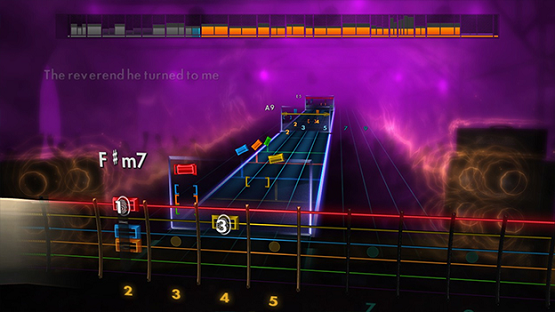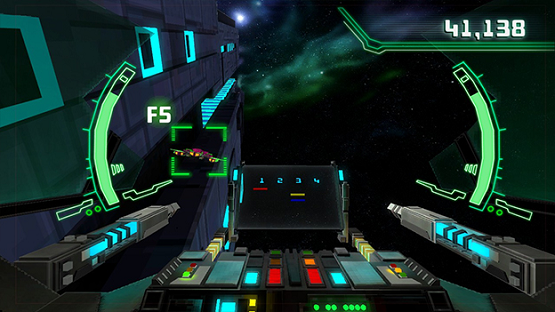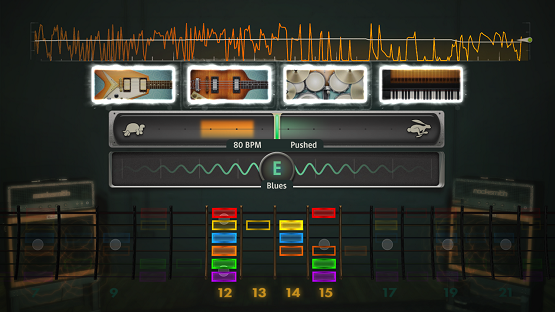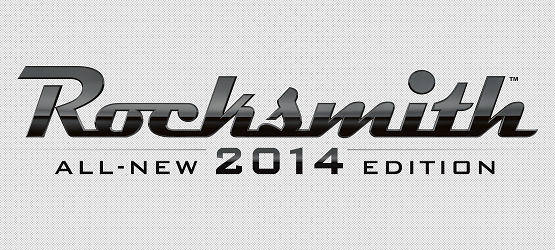I thought Rocksmith 2014 was going to be a quick and simple review. I’ve played the first one, so I’d just pop this one in, run through the feature set to see what it has to offer and hammer out a review in time for dinner. What I failed to anticipate was that I would get sucked in to the personalized vortex that is Ubisoft’s latest guitar trainer/game hybrid. After numerous hours of playing over the last three days, my sore fingers finally gave in and I traded my fretboard for a keyboard to bring my Rocksmith 2014 experience to you.
Upon booting up the game, it asks a few simple questions to get started. Have you played the original Rocksmith? What skill level would you rate yourself? Do you want to focus on lead, rhythm, or bass guitar? All of these questions have easy to understand explanations so that players know what the game considers to be a ‘novice’ versus ‘master’ skill level. I selected my options and based on my experience with the previous game and guitar in general, it skipped over some of the early tutorials and lessons that people new to Rocksmith would end up seeing. Having owned the first game, it also gave me the option of importing all of those songs for $9.99 (which I very quickly did). I didn’t need to put the disc in, so it seems this feature may be tied to your trophy or save data.
The interface is extremely clean and easy to navigate and load times across the game are nearly non-existent, which are massive improvements over what proved to be a huge barrier in the original Rocksmith. Selecting a song to play will throw you into the track within seconds, without a load screen in between. In addition, nearly all of Rocksmith 2014′s features are unlocked and available to use from the start, and all are within a few button presses of each other. This simplicity made it much easier to get right into what I was playing the game for: to play the guitar.

Starting things off, Rocksmith 2014 assigned me three missions. These were simple things like checking out a lesson on chords and trying my hand at playing a song. Right from the beginning no two players’ Rocksmith 2014 experiences are going to be the same. The game intelligently analyzes how you are playing, what you do well at, and what you need to work on to assign you missions, as well as song specific assignments called ‘Rocksmith recommends’. I played through the Green Day track X-Kid and at the end it suggested that I play one of the Guitarcade games to work on my chord progressions. It also suggested looking at a specific chord in the chord book so see how to properly fret it, as well as challenged me to try to hit at least 75% accuracy on the song the next time that I played. Everything is accessible from the song menu and selecting the Guitarcade recommendation took me directly into the game, again with hardly any load times to speak of. I can’t stress enough how the ease of navigation has vastly improved in this new edition of Rocksmith.
The Guitarcade in Rocksmith 2014 has been expanded to include more minigames to help you hone and work on various skills, from switching frets and strings, to chord progressions and scales. The games are styled after old arcade games, some of which even go as far as to have characters and bosses to bring a real level of interest to what is traditionally seen as redundant when practicing. For example, Scale Warriors is a 2.5D arcade beat ’em up and Return to Castle Chordead is an on rails shooter, and they help to practice scales and chord progressions respectively.

Let’s say you aren’t as familiar with the guitar as I am, and you aren’t familiar enough with scales or chords (or a large variety of other skills) to jump into the minigames. Rocksmith 2014 includes a massive lesson library with video lessons and practice tracks that will teach you every little thing you could wish to know about guitar, from how to hold your pick correctly to how to play chords, and even as far as proper care and handling of your guitar. The videos and descriptions are very clear and do a great job teaching each of the subjects. Once again, all features are available from the moment you boot up the game, so if you want to jump right in and have the lesson on harmonics be the first thing you do, go for it. Itching to play Scale Warriors? The arcade is open. Want to check out the Session Mode? Let’s actually head there now.
While the rest of Rocksmith 2014 is expanded from its predecessor, Session Mode is an all new mode exclusive to this game. Session Mode is essentially AI musicians that play along with you organically to create the experience of jamming with a band. Choose your accompanying instruments and your key and simply jam. I was worried that session mode would be far too advanced for the average player, and that I wouldn’t get any enjoyment out of this innovative addition, but I was wrong. Session Mode displays the scale for the key that you are playing in. Keep to those notes and your session will sound great, regardless of your skill. Before I knew it, I was getting into playing a simple scale and felt like a rock star in my own basement. I can’t speak for anybody of a lower guitar skill level than me, but armed only with a basic knowledge of scales, I was able to have a ton of fun in the Session Mode. After a bit of time learning in the rest of the game however, any player should be able to find this mode accessible. For the more expert players, the customization options in Session Mode are quite extensive as well.

Nearly every step of the way, it felt like the game was specifically made for me. Couple that with how quickly I could traverse the features and I was working on my guitar skills in the way that fit best for me personally. The one issue that I had early on was that sometimes the game felt like it was pushing its own agenda rather than an interest in my playing. One mission given to me early was to play around in the tone creator. I felt like this wasn’t a natural direction to take me based on what I was playing, but I do applaud that Rocksmith 2014 wanted to give me a taste of everything that the game had to offer. It’s easy to ignore the game’s suggestions if you don’t feel that they best apply to you and your learning and Rocksmith 2014 will readjust its recommendations regularly to keep up.
It’s hard to put a score to a game like this. It’s a title with a very specific purpose and real world application in mind, and for that alone I could give it a nearly perfect score. It is lag free (based on my home theater setup), load free, and features a simple yet modern interface design. Navigation is extremely quick meaning you spend more time playing and less time figuring out where to go, and the song selection is varied enough that there is something for everyone. While Rocksmith 2014 won’t be replacing the guitar teacher, it was designed as a supplemental tool to make learning and practice a lot of fun. I feel that it succeeds in this design and is an essential addition to any guitarist’s arsenal, whether you’re picking up a guitar for the first time or you’ve been playing for years.
Review copy provided by developer.
Note: Rocksmith 2014 will not make you a Guitar God overnight or without any effort. It is hard work and as with learning anything new, you will need to endeavor in order to get anything out of it. If you are truly committed to learning and improving on the guitar, stick with it! I will be taking Rocksmith 2014‘s 60-day challenge to see what kind of improvement I see in my playing with consistent work and practice. Stay tuned to PlayStation LifeStyle as I report back on my long term experience with Rocksmith 2014.
-
Learn/practice guitar in the most accessible and fun way possible.
-
Varied song selection with new DLC coming constantly.
-
Virtually no load times.
-
Recommendations personalize the game to you.
-
Early missions seem to push the game's own agenda.
-
Some won't find enjoyment in this...
-
...simply because they don't want to put in the effort required.








